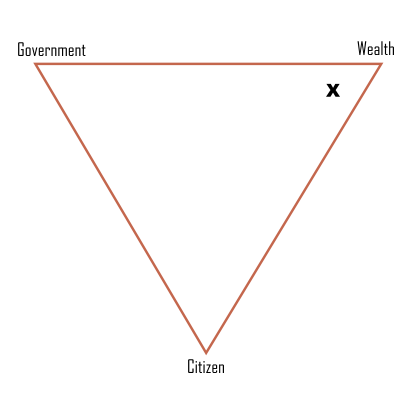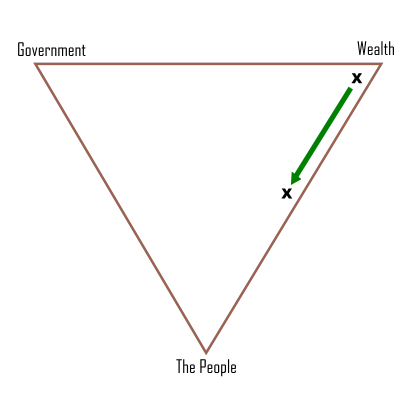IN THE LAST FEW POSTS, I've outlined what I believe to be the real debate in the subtext of the health care reform.
We've been presented, time and time again, with the choice between capitalism and socialism.
We've been told that any move toward government involvement in anything (except, oddly enough, personal moral decisions) is a move toward socialism, communism, and dictatorship.
The same voices tell us that the only alternative to this is capitalism—which usually means that the government should do whatever is to the benefit of the super wealthy and the large corporations.
Every choice we make moves us toward one end of this continuum or the other, according to this view.
In the case of health care, our current position is about here:
![]()
The large health insurance companies enjoy very little government regulation, even less than most big companies, but there is some, which is why the X is not at the extreme right end of the line.
The problem with this view of health care reform is that it leaves out a major player—you and me: we the people of the United States of America.
The continuum ignores us, telling us that the only choice we have is the choice between big corporations and big government.
If we include ourselves as a possible center of power, we can ask how much choice, how much freedom, and therefore how much of the power any reform leaves in our hands as individuals.
On that model, the current situation looks something like this:

Two things become more clear when we add ourselves to the picture:
- Some government control on capitalism is necessary if we are to move power downward to ourselves.
We can't expect to fight extreme wealth and corporate power without making use of our government to put some limits on what corporations are allowed to get away with. - The real question isn't how far right or left we're moving, but how far up or down.
The trick is to give the average citizen more power over the things we care about, and both the government and the wealthy corporations less.
Using this model, we can put Republican and Democratic proposals side by side and compare them with an eye to where they would move the power.
The following list compares the Republican health care reform proposal to the Democratic proposal passed by the House:
- Using groups to negotiate for health care insurance:
The Republican plan would provide for private insurance pools, which could negotiate with insurance companies directly. These pools would not be subject to the laws passed by individual states to protect their citizens from
various insurance company practices.
The net effect would be to provide a market for insurance companies which was free from state regulation.
The Democratic plan would provide for an insurance exchange, a market place where individuals could choose from plans which the states negotiated for with insurance companies on the basis of larger numbers in the exchange.
The companies would still be bound by state laws, and any citizen using the exchange would be able to choose from a variety of plans with different companies.
Small business would also be able to use the plan, to help them compete with big business.Democratic Plan
Republican Plan
Provision Moves Us Toward Provision Moves Us Toward The Insurance
ExchangeDemocracy, Freedom Insurance Pools Capitalism, Corporate Power over citizens - Changing the market dynamics.
The Democratic plan provides for a government-run health insurance company—self-supported, much like the post office. It would provide an additional choice to consumers and additional competition to the insurance corporations.
The point is to make sure that the free market works properly, given the stacked deck where health-care is concerned. Health care is something people just can't go without, so as long as only large corporations can provide it, the market favors ever-increasing prices.
The Republican plan would not include a public option—leaving the deck stacked in favor of the corporations. Instead, it would allow people to buy insurance across state lines.
Although that sounds like an increase in individual freedom, the effect would be, once again, to free insurance companies from regulations we, the people, have put on them through the states.
Under this system, the only insurance available would soon be from the states with the laws most friendly to insurance companies.Democratic Plan
Republican Plan
Provision Moves Us Toward Provision Moves Us Toward The Public
OptionDemocracy, Freedom Out of State Sales Capitalism, Corporate Power over citizens - Changes in current laws.
The Republican bill would make lawsuits against doctors and insurance companies more difficult. This might save the insurance companies a little money, but it would make it harder for you and me to hold the corporations accountable, and so would encourage them to push the limits.
The Democratic bill would provide for measures to keep insurance companies from lying, to oversee the health insurance exchange and keep it honest, to give better information to consumers and health care providers, to force drug companies to give rebates to Medicare and Medicaid patients, and to bar Insurance companies from refusing to cover people with pre-existing conditions.Democratic Plan
Republican Plan
Provision Moves Us Toward Provision Moves Us Toward Greater Supervision Democracy, Freedom Limiting Lawsuits Capitalism, Corporate Power over citizens - Government subsidies.
The Democratic bill would subsidize health care for the disabled, the poor, and the elderly. -
The net effect of these subsidies would be to provide more freedom to those three groups and their caretakers, while improving public health in general, taking the burden off of emergency rooms, and providing greater security for all.
It's hard to concentrate on contributing to your community, building a small business, or finding a good job so you can move into the middle class when you're obsessed with worry about health care for your children or aging parents, waiting long hours in emergency rooms for routine care, or trying to make it through the day without the medicine the doctor prescribed.
The Republican bill would provide incentives to states to come up with innovative reforms to lower health care costs.
Since it also has two provisions—one mentioned above, and the other below—to remove health care from state control, the value of those incentives are next to zero.Democratic Plan
Republican Plan
Provision Moves Us Toward Provision Moves Us Toward Subsidies for the Disabled, Poor, and Elderly Democracy, Freedom Incentives to States for Innovation No Effect
The disagreements about health care reform are not about health care reform.
They are about how health care reform will shift the power in this country—toward wealth and large corporations, or toward us, the people.
The Democratic bill, passed in the House, shifts the power like this:

The Republican Bill put up against it would have shifted the power like this:

This gives you a pretty good sense of the values and interests of each party at this point in history.
Republicans were not always the lackeys of corporate power, and Democrats have not always been on the side of the people.
But at the moment the Republican party is far more owned by big money in one form or another, and the Democrats, though they have their faults, are more responsive to us.
We should take advantage of that fact while we can.
At least, that's what I think today.
What do you think? Comments below...






